China Arts & Entertainment
Looking Back on the 2024 CMG Spring Festival Gala: Highs, Lows, and Noteworthy Moments
Reflecting on the highs and lows of this year’s China Media Group Spring Festival Gala, the world’s most-watched television program.
Published
5 months agoon
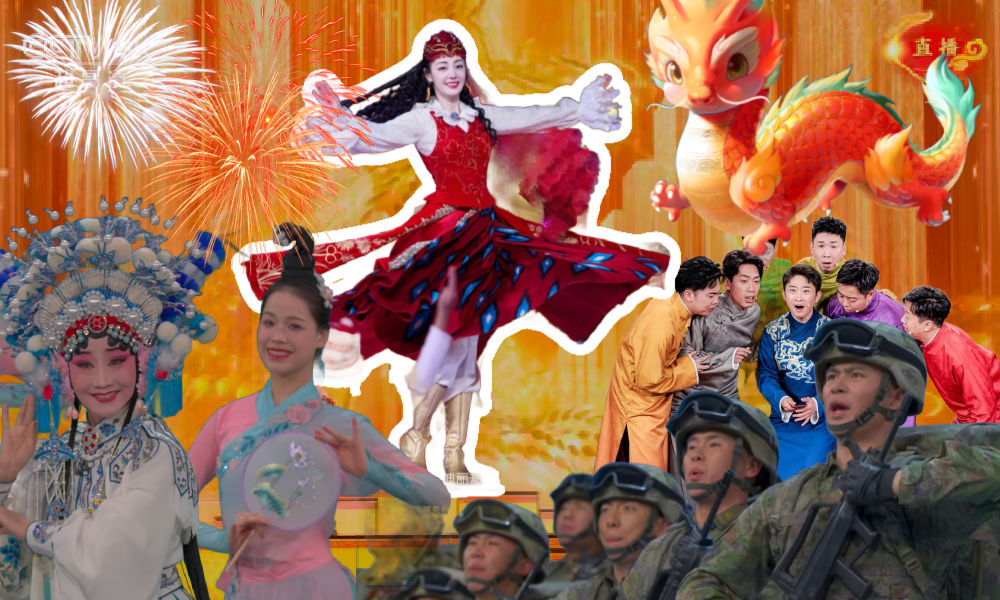
PREMIUM CONTENT
The biggest media spectacle of the Chinese New Year is the annual CMG Spring Festival Gala. The entire week, this four-hour extravaganza featuring forty-six performances has dominated social media conversations.
The 42nd edition of The CMG Spring Festival Gala was broadcasted on February 9th, celebrating the start of the Dragon Year. This year, the show reportedly attracted 679 million viewers.
The annual Spring Festival Gala by the state-run China Media Group (CMG) has become an integral part of the Lunar New Year celebrations for Chinese people since its debut in 1983. As the world’s most-watched live-broadcasted entertainment program, the Gala is now aired across dozens of channels, both in China and abroad, both on television and online.
China’s Spring Festival Gala (中国中央电视台春节联欢晚会) is commonly abbreviated to Chūnwǎn (春晚) in Chinese. Over the past week, the Chūnwǎn became a much-discussed topic on Chinese social media and dominated all trending lists during the Chinese New Year’s Eve.
The Gala, which lasts a total of four hours, shows the very best of China’s mainstream entertainment and Party propaganda and is a mix of culture, commerce, and politics. Through music, dance, art, and comedy, the event serves as a significant platform for the Party to disseminate official ideology. It is also a chance to present the nation’s top performers while showcasing digital innovations.
A “No-Covid”, Traditional Gala
The phrase “There will never be a worse, just worse than last year [中央春晚,没有最烂,只有更烂]” has become a well-known saying among viewers about the Chūnwǎn, as complaining about the show is very much part of the tradition. However, was this year really worse than last year? Not at all.
This 2024 edition was directed by Yu Lei (于蕾), who also directed the 2023 Gala. The 45-year-old female director previously also served as the general scriptwriter and overall designer for the Gala.
Not only was the director the same as last year, but the five main hosts were also exactly the same. They include Ren Luyu (任鲁豫, 1978), the TV host from Henan who has now become one of the most familiar faces on the show; Sa Beining, also known as Benny Sa (撒贝宁, 1976), who is famous for his CCTV work and for hosting the Gala regularly over the past twelve years; Nëghmet Raxman (尼格买提, 1983), a Chinese television host of Uyghur heritage who has hosted the Gala seven times since 2015; Long Yang (龙洋, 1989), a CCTV host from Hunan who presented the Gala for the third time this year; and Ma Fanshu 马凡舒 (1993), who was the youngest and newest host during the 2022 Gala and has been presenting it since.

The choice of director and presenters suggests that continuity and consistency were important for this year’s Chūnwǎn. Although the Gala’s format is always more or less the same, including songs, dances, cross-talk, sketches, traditional opera, martial arts, magic, etc., this year’s Gala stood out for sticking to tradition.
Over the past few years during the pandemic, several elements of the show were altered to adapt to the new situation. From 2021 to 2023, the show was only broadcast from the Beijing Studio and focused less on big spectacular scenes. Since 2020, the battle against Covid has also been a theme in the show. In 2020, the Gala included a segment that was broadcast live from a Wuhan hospital to show how medical staff were spending their Lunar New Year taking care of Covid patients. That was the first time since 1983 for the Gala to include a segment that was not meticulously rehearsed.
From 2021 to 2023, the nation’s battle against Covid was also a theme in songs and other segments, reflecting on the daily lives of ordinary people. In 2021, for example, Jackie Chan sang “Tomorrow Will Be Better” (明天会更好), which addressed the epidemic situation and honored all who joined in the fight against the virus.
However, the theme of Covid played no role at all anymore in this year’s Chūnwǎn, which focused entirely on celebrating the Year of the Dragon, the home, and the nation (龙行龘龘,欣欣家国). Similar to the pre-2020 Gala, this 42nd edition was broadcast not only from the Beijing venue but also included performances in four other locations: Shenyang, Changsha, Xi’an, and Kashgar. Continuity was also seen in the 46 acts of the night, as many familiar faces, such as Sun Nan (孙楠) and Han Hong (韩红), performed during the night.
Highlights of the 2024 Gala
● The xiangsheng (相声) act “Director’s Worries” (“导演的心事”) was the most-watched act of the entire show according to the viewership ratings – this also relates to the time of the broadcasting. Xiangsheng is a traditional Chinese comedic performance that involves a dialogue between two performers, using rich language and many puns. This act was performed by comedians Jin Fei (金霏) and Chen Xi (陈曦). They were also joined by others, turning it into a “group xiangsheng” (群口相声) that humorously portrayed the mental strains faced by Chinese young people and served as a source for parodies and memes on social media.

● The Song “Dragon” (龙), performed by famous pop singers Zhang Jie aka Jason Zhang (张杰) and Sun Nan (孙楠) was particularly popular this Gala. The song encompassed the main theme of the Dragon Year, as they sang about how a dragon lies in every Chinese person, representing the spirit and strength of the Chinese nation over the past five thousand years. This song integrated popular entertainment with the essence of the Chinese New Year, cultural heritage, and national pride, making it the perfect anthem for the Spring Festival Gala. One Weibo post by Zhang Jie about his performance received nearly 167,000 comments and over 176,000 shares.
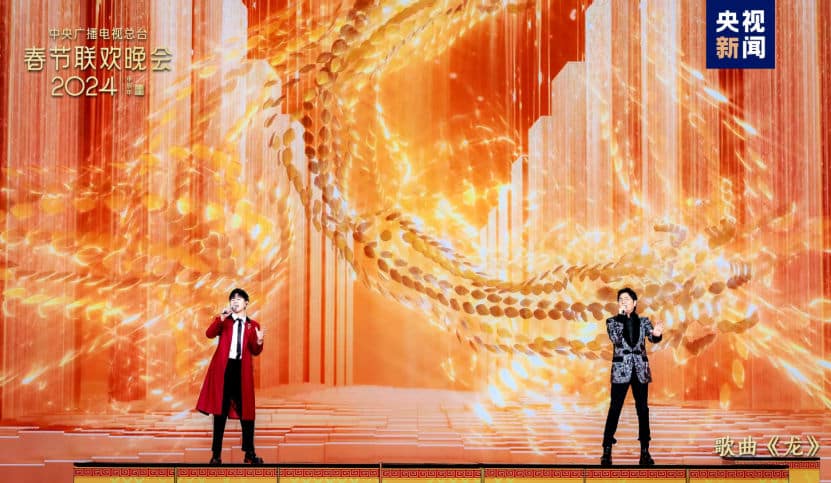
● The performance of “Koi Carp” (锦鲤) featuring lead dancer Hua Xiaoyi (华宵一) and the Beijing Dance Academy (北京舞蹈学院) was another standout moment of the Gala. The ‘painting’ dance “Only This Green” (只此青绿) stole the spotlight in 2022, while the ’embroidery’ dance “Splendid” (锦绣) was one of the highlights of the show in 2023. Continuing the tradition of presenting top-notch, artistic dance that merges tradition with technology, the Koi Carp dance had a similar charm, with dancers suspended on spring ropes performing an exquisite aerial dance that made them look like graceful fish underwater.

● The creative act “Start Something New” (别开生面) directed by the renowned filmmaker Zhang Yimou (张艺谋) was a highlight in the show for its originality. The act, which combined cooking, dancing, and singing, presented various Lunar New Year customs and food cultures from different regions in China. Besides directing films, Zhang Yimou also has a lot of experience as a creative director of major shows, including the 2008 Summer Olympics opening ceremony, the 2022 Winter Olympics opening ceremony, and the outdoor night show Impression Sanjie Liu.
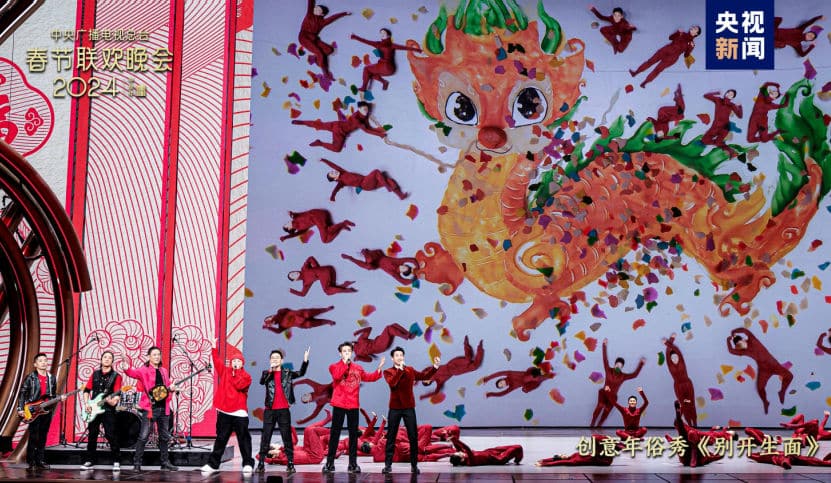
● The Xi’an special segment “Poem for the Landscape of Chang’an” (山河诗长安) performed by Zhang Ruoyun (张若昀), Tang Shiyi (唐诗逸), Zhu Tiexiong (朱铁雄) PACT (派克特), Yang Li (杨力) and conductor Sun Yifan (孙一凡), was among the most spectacular ones of the night. This was an ode to Xi’an and Chinese poet of the Tang Dynasty, Li Bai. Filled with lion and dragon performances, opera, rap, dance, and specially arranged music by the Xi’an Symphony Orchestra, the segment included a virtual version of Li Bai joining the spectacle. On social media, netizens praised the performance and posted many gifs of the Chinese actor Zhang Ruoyun together with the virtual version of the classical poet Li Bai.

The ‘Lows’ of the 2024 Gala
● The various xiaopin (小品, skits) were not very well-received. Over the past few years, the Gala’s dance and song performances have actually become among the most beloved acts – far more popular than the xiaopin, which did not get much positive feedback this year at all. Some people said they just “didn’t get” the humor or that the sketches were just not entertaining enough.
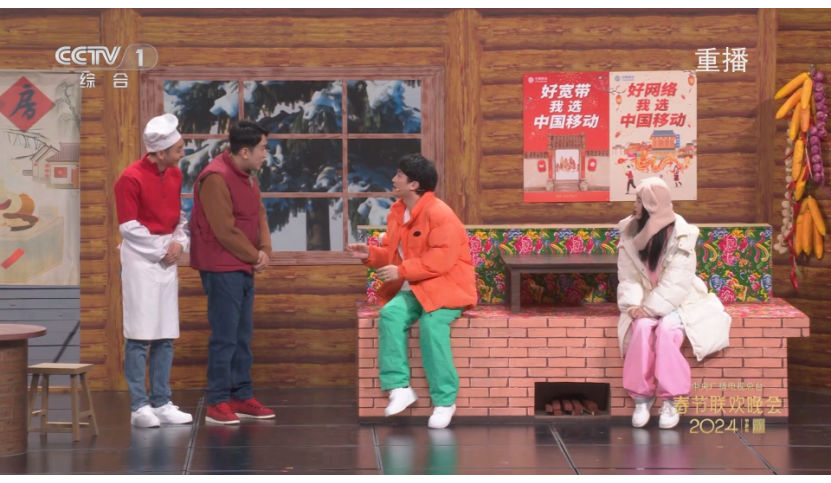
● The song “Unforgettable Night” (难忘今宵) was the least viewed part of the show according to viewership ratings, and it marked a departure from tradition in a significant way. Since the 1980s, the final song of the Spring Festival Gala has always been “Unforgettable Night,” sung by Li Guyi (李谷一). Li Guyi rose to fame with the song “Homeland Love” (乡恋) during China’s Reform and Opening Up era, and her songs evoke nostalgia for many viewers. She made her first appearance at the Gala in 1983 and became the most frequent performer at the event. Due to her recovery from Covid in the hospital, she was unable to perform at last year’s Chūnwǎn, and her absence from this year’s show was not only a significant disappointment for many but was also seen as the end of an era. Additionally, many people commented that they did not appreciate the new interpretation of the traditional song.
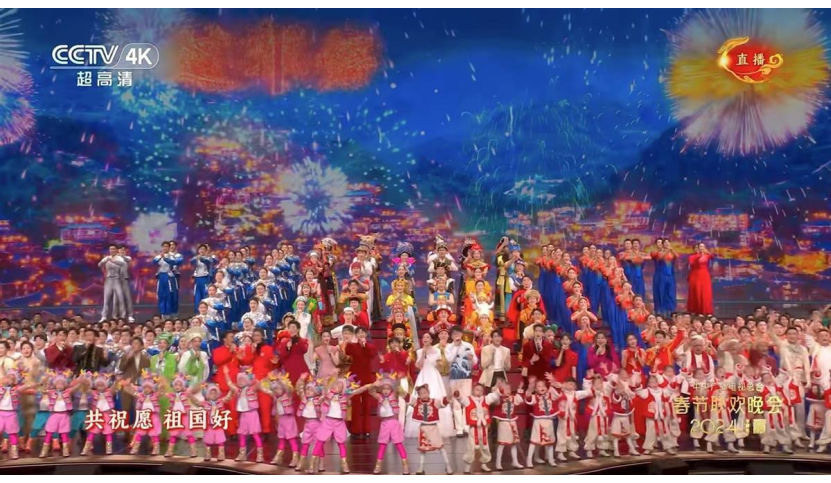
● The PLA song “Decisive Victory” (决胜) drew attention from Taiwanese media outlets, highlighting it as a controversial moment of the Gala. The performance of this military song, delivered by artists from the PLA Cultural and Artistic Center, featured soldiers clad in combat gear marching and dancing on stage, while the backdrop displayed images of rockets, tanks, and other war-like scenes. Taiwanese media framed the song within the context of mainland China’s military threats against Taiwan. Some Weibo commentators also interpreted the performance in this light, particularly noting the sequence where singers from Taiwan and mainland China first sang the song “Etiquette” (礼序) together just before the People’s Liberation Army performed the military song. This was seen as a statement of “diplomacy comes before violence” (“先礼后兵”).
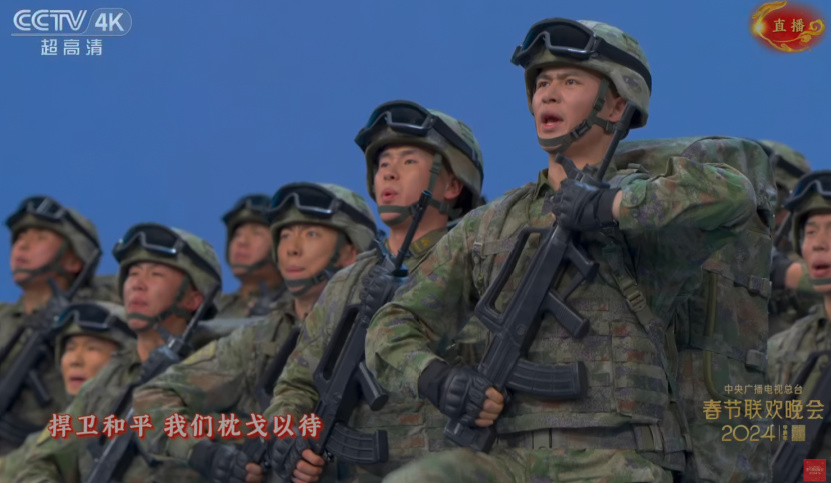
The Noteworthy
● The magic show “Guarding the New Year Together” (守岁共此时) performed by Liu Qian (刘谦) created quite a buzz. During a card trick involving the audience and Gala host Nëghmet Raxman, it seemed like Raxman’s cards didn’t match as intended. Although everyone was supposed to have matching cards, Raxman’s expression revealed that his two cards did not match. This led to much banter online, and Nëghmet Raxman – and his nervous expression – became a trending topic.
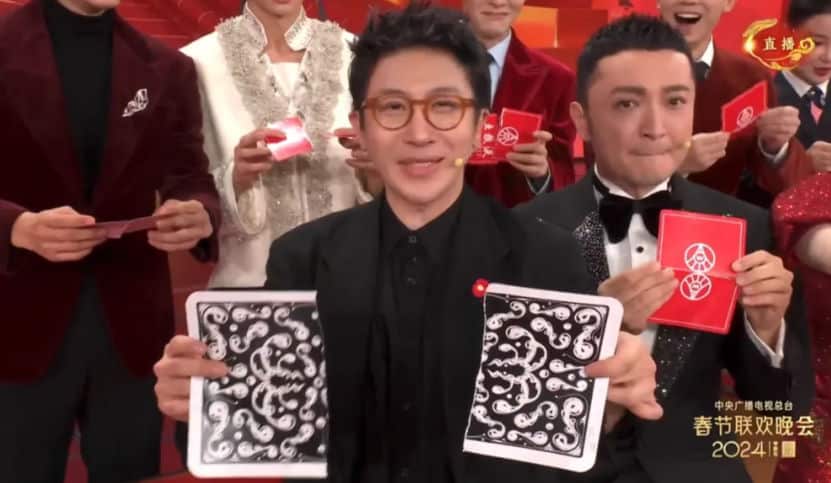
● The song “Climbing Spring Mountain” (上春山) performed by Wei Chen (魏晨), Wei Daxun (魏大勋), and Bai Jingting (白敬亭) became one of the most discussed acts in the week following the Gala after a rehearsal video was posted online and netizens noticed inconsistencies in the singers’ attire and positions on stage. It was rumored that Bai Jingting may have intentionally vied for a more prominent position to attract more attention on stage, resulting in choreographic asymmetry and some apparent confusion during the song. One important reason why the main rehearsal video triggered controversy is because a tape of the official rehearsal always runs concurrently with the live broadcast, allowing producers to seamlessly switch to the taped version in the event of a problem or disruption without TV audiences noticing. But because Bai changed his outfit, wearing black while the others wore white, and because he did not give up his main spot during the performance, it might have been impossible for producers to switch to a rehearsed version of the song (even though the lip-syncing during the performance was completely out of sync).
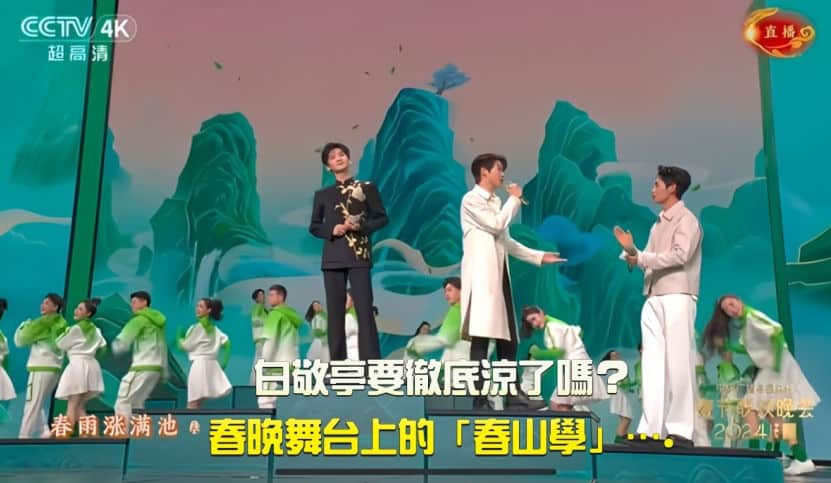
● The song “A Friend Like You” (像你这样的朋友) attracted a lot of attention on Weibo and beyond this week as it was performed by the so-called “0713 Super Boys,” including Wang Zhengliang (王铮亮), Chen Chusheng (陈楚生), Allen Su (苏醒), Zhang Yuan (张远), Lu Hu (陆虎), and Wang Yuexin (王栎鑫). In 2022, these once nearly ‘forgotten’ singers made a remarkable comeback through the reality TV hits Welcome to the Mushroom House (欢迎来到蘑菇屋) and Go for Happiness (快乐再出发). They initially gained fame in 2007 after participating in the singing contest Super Boy but gradually faded into obscurity in the years following their initial success. Their gala performance marks their ultimate comeback.

● “Belle” (美人) from the French musical Notre Dame de Paris was performed at the Gala in French by various French and Chinese performers, including Angelo Del Vecchio and Liao Changyong. “Who would have ever expected for Notre Dame de Paris to be performed at the Chūnwǎn in French?” one commenter wrote. The Gala provided some subtitles during the song to convey the general idea of the song. Although the Gala usually incorporates an international element, this was the first time for a song to be fully sung in French. The song was presented in the context of China and France celebrating their 60th anniversary of diplomatic relations this year.

● Dilraba Dilmurat (丽热巴) in “Dances of Xinjiang” (舞乐新疆) was praised by commenters as the most beautiful performer of the night. The Chinese actress of Uyghur ethnicity showcased her dancing skills during the Kashgar segment of the evening. Not only was her performance notable for its beauty and grace, but it also garnered attention online due to a video recorded by an audience member showing Dilmurat slipping and falling on her bum during the show, after which she promptly got up and continued. After all, the show must go on!
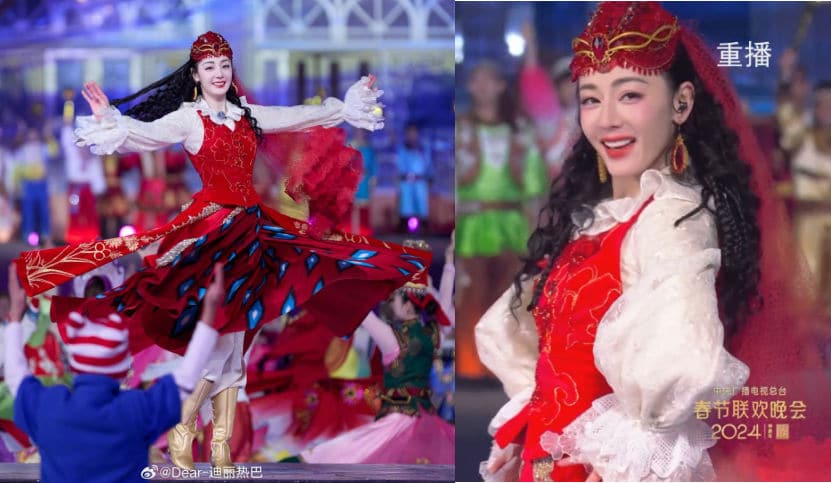
Watch the full performance on Youtube here
Want to know more about the previous editions of the Spring Festival Gala? Also check out our articles below:
– 2023: Behind the Short Feature Film of the Spring Festival Gala
– 2023: Top 5: The Highlights of China’s 2023 CGM Spring Festival Gala
– 2023: Watching ‘Chunwan’: Liveblog CMG Spring Festival Gala
– 2022: Chunwan 2022: The CMG Spring Festival Gala Liveblog by What’s on Weibo
– 2021: Spring Festival Gala Draws Criticism for Gendered Jokes
– 2021: The Chunwan Liveblog: Watching the 2021 CMG Spring Festival Gala
– 2020: CCTV New Year’s Gala 2020
– 2019: The CCTV Spring Festival Gala 2019 Live Blog
– 2018: About the CCTV Spring Festival Gala’s ‘Racist’ Africa Comedy Sketch
– 2018: CCTV Spring Festival Gala 2018 (Live Blog)
– 2017: The Best and the Worst of CCTV New Year’s Gala 2017
– 2017: CCTV New Year’s Gala 2017 Live Blog
– 2016: CCTV’s New Year’s Gala 2016 Liveblog
By Manya Koetse
With contributions by Miranda Barnes
Get the story behind the hashtag. Subscribe to What’s on Weibo here to receive our newsletter and get access to our latest articles:
Spotted a mistake or want to add something? Please let us know in comments below or email us. First-time commenters, please be patient – we will have to manually approve your comment before it appears.
©2024 Whatsonweibo. All rights reserved. Do not reproduce our content without permission – you can contact us at info@whatsonweibo.com.
Manya Koetse is the founder and editor-in-chief of whatsonweibo.com. She is a writer, public speaker, and researcher (Sinologist, MPhil) on social trends, digital developments, and new media in an ever-changing China, with a focus on Chinese society, pop culture, and gender issues. She shares her love for hotpot on hotpotambassador.com. Contact at manya@whatsonweibo.com, or follow on Twitter.

Also Read
China Arts & Entertainment
Singing Competition or Patriotic Fight? Hunan TV’s ‘Singer 2024’ Stirs Nationalistic Sentiments
“I’m in Zibo eating barbecue, I really don’t feel like listening to Alicia Keys.” Hunan TV’s ‘Singer 2024’ has set off a new wave of national pride in China’s music and performers.
Published
2 months agoon
May 17, 2024By
Ruixin Zhang
Besides memes and jokes, Hunan TV’s ‘Singer 2024’ has set off a new wave of national pride in China’s music and performers on Chinese social media.
In May, while the whole of Europe was gripped by the Eurovision Song Contest frenzy, Chinese audiences were eagerly anticipating the return of their own beloved singing competition, Singer 2024 (@湖南卫视歌手), formerly known as I Am a Singer (我是歌手).
The show, introduced from South Korea’s MBC Television and popular in China since 2013, only features professional singers who have already made a name for themselves.
Rather than watching unknown aspiring singers who are hoping to be discovered in many singing competitions, such as Sing! China, Singer 2024 gives audiences a show filled with professional and often stunning show performances by established names in the entertainment industry.
Since 2013, renowned singers from China and abroad have appeared on the show, including Chinese vocalist Tan Jing (谭晶), British pop singer Jessie J, and the late Hong Kong pop diva Coco Lee. However, no season managed to create as many waves as the 2024 season did, dominating all social media trending topics overnight.
So, what exactly happened?
COMPETING WITH FOREIGNERS
“The difference between the Grammys and the Strawberry Musical Festival”
In early May, the pre-show promotion of Singer 2024 was already buzzing on Chinese social media after a list of featured singers appeared on Weibo, including big names such as American singer-songwriter Bruno Mars, Korean-New Zealand singer Rosé from Blackpink, and Japanese diva LiSA.
Although Singer previously had many foreign singers on the show, this international celebrity lineup still caused a stir.
On the day of the first episode, only two foreign singers were announced to appear on the show: young Moroccan-Canadian singer Faouzia and the Grammy-nominated American singer-songwriter Chanté Moore. The other contestants were all Chinese singers who are already well-known among Chinese audiences. Because many people were unfamiliar with the two foreign singers, they joked that the winner of this season was already set in stone; surely it would be the famous Chinese singer Na Ying (那英), known for her beautiful voice.
However, that first episode surprised everyone as the two foreign singers, Faouzia and Chanté Moore, showed outstanding vocal skills. This not only startled many viewers but also made the Chinese contestants uneasy. Several experienced Chinese singers apparently were so unnerved after watching Faouzia and Chanté Moore’s performance that their voices trembled when singing.

Since the show was broadcast live – without post-production editing or autotune – audiences got to hear the actual vocal capabilities and see performers’ genuine reactions. It seemed undeniable that the foreign contestants did much better in terms of vocals and stage presence than the Chinese ones. Some online commenters even said that the gap between Chinese and foreign singers’ levels was like “the difference between the Grammys and the Strawberry Musical Festival” [a local Chinese music festival].
Chinese online influencer Yongkai (@陈咏开165) shared screenshots of Chanté Moore’s backstage reactions during the show. The American celebrity seemed puzzled when hearing the somewhat underwhelming performance by Chinese singer Yang Chenglin (楊丞琳), and she appeared much more positive when Na Ying sang.

This noteworthy scene, coupled with Chanté’s comments during an interview saying that she thought the Chinese production team had invited her on the show to be a judge, turned the entire show into a display of foreign singers outshining the Chinese contestants.
By the end of the first episode, Chanté Moore and Faouzia unsurprisingly ranked first and second, with Na Ying in third place.

After the show, some online commenters jokingly pointed out that Na Ying, being of Manchu descent like the rulers of China during the Qing Dynasty, showed some similarities to Empress Dowager Cixi’s defiance against Western colonizers in the way she “single-handedly took up against on foreigners” on the show.
They humorously turned Na Ying’s expressions into memes resembling Empress Dowager Cixi from an old Chinese TV show, with captions like “I want the foreigners dead” (“我要洋人死”).

Others suggested finding better Chinese singers for the show who could compete with Faouzia and Moore.
“SINGING WELL” CULTURALLY COLONIZED?
“I’m in Zibo eating BBQ, I really don’t want to listen to Alicia Keys.”
Initially, discussions about the show were light-hearted and humorous, until some netizens who couldn’t appreciate the jokes began to dampen the mood and made online discussions more serious.
Zou Xiaoying (@邹小樱), a music critic with nearly two million followers, posted on social media after the show, stating that he would have never voted for Chanté Moore or Faouzia. Not only did Zou question their vocal talent, he also wondered if the aesthetic of Chinese listeners had been influenced by Western music taste to such an extent that it has been “culturally colonized” (“文化殖民”). Meanwhile, he praised the members of Beijing rock band Second Hand Rose as “national heroes” (“民族英雄”).
He wrote:
If I had three votes for the first episode of “Singer 2024,” I’d vote for Second Hand Rose, Na Ying, and Silence Wang [note: Chinese singer-songwriter and record producer Wang Sushuang 汪苏泷]. The reason I wouldn’t vote for Chanté Moore or Faouzia is because — do they actually sing so well?
Has our definition of “singing well” perhaps been colonized? Just as our modern-day use of Chinese has little to do with our classical Chinese poems, with the foundation of modern Chinese actually being translations from the 20th century, is this also a form of ‘cultural colonization’?
You must think I’m talking nonsense again. But when I listen to Chanté Moore singing “If I Ain’t Got You,” I find it too boring. I know her singing is “good,” but this “good” has nothing to do with me. If, for Chinese listeners, Chanté Moore’s “good” is the standard, then is that what we in the music industry should be working towards? Isn’t that funny? When you open QQ Music or NetEase Cloud Music, and it recommends these songs to you every day, won’t you be convinced to practice again?
Of course, I know Chanté Moore is in good shape, very relaxed. Actually all of the Chinese singers tonight were very nervous. Yang Chenglin (杨丞琳) was nervous, Na Ying was also nervous. Even a seemingly carefree band like Second Hand Rose, if you listened to the introduction of their song, [you’ll find] they were so nervous that Yao Lan, supposedly “China’s No.1 Guitarist”, was so nervous that he hit the wrong note. It was not even a fast-paced solo (…), how nervous could he be? When everyone’s so tense, the confidence of Chanté Moore and Faouzia is indeed something that East Asia can’t match. In East-Asian [entertainment] circles, represented by China/Japan/Korea, our different cultural habits, upbringing, and ethnic characteristics have made it so that we don’t possess these kinds of singing abilities, even including our ways of emotional expression. I don’t know from which season it started with ‘Singer’ – and if it’s some kind of Catfish Effect (鲶鱼效应 ) – that they brought international singers with different cultural backgrounds into the competition. But this isn’t the Olympics, it’s not like Liu Xiang [刘翔, Chinese gold medal hurdler] is going to defeat opponents from the United States or Cuba. “I’m in Zibo eating barbecue, I really don’t feel like Alicia Keys.” (This line is not mine, I stole it from my WeChat friend).
Because of this, I find Second Hand Rose even more rare and precious. It’s just like I used to love asking: If you could only recommend one Chinese band to your foreign friends, which one would you recommend? Some say it’s New Pants (新裤子), some say it’s Omnipotent Youth Society, but my answer will always be Second Hand Rose. ‘The drama of Monkey King is a national treasure,’ its light will always shine. Facing the gunfire of Western powers, Second Hand Rose is standing on the frontline, they are our national heroes. Indeed, the band itself was nervous, (..), but when Chanté Moore goes off like a singing dolphin, we are fortunate to have Second Hand Rose at the frontline; the Chinese sons and daughters are building the Great Wall of Music of flesh and blood.
Because of this, I find Second Hand Rose even more rare and precious. It’s just like I used to love asking: If you could only recommend one Chinese band to your foreign friends, which one would you recommend? Some say it’s New Pants (新裤子), some say it’s Omnipotent Youth Society, but my answer will always be Second Hand Rose. ‘The drama of Monkey King is a national treasure,’ its light will always shine. Facing the gunfire of Western powers, Second Hand Rose is standing on the frontline, they are our national heroes. Indeed, the band itself was nervous, (..), but when Chanté Moore goes off like a singing dolphin, we are fortunate to have Second Hand Rose at the frontline; the Chinese sons and daughters are building the Great Wall of Music of flesh and blood.
Anyway, no matter if they’re strong or not, I would never vote for the foreigner.
The comment about ‘I’m in Zibo eating barbecue, I really don’t feel like [listening to] Alicia Keys’ refers to the craze surrounding China’s ‘BBQ town’ Zibo. In Zibo, Chinese visitors like to sing, drink beer, and enjoy food together; it’s a simple and modest way of appreciating life and music, which contrasts with slick and smooth American or foreign styles of performing and singing.
Whether Zou’s criticism was for attention or genuine sentiment, it shifted the focus of the discussion from music to patriotism.
CHINESE SINGERS WITH MILITARISTIC UNDERTONES
“I volunteer to join the battle”
Amidst all this, some netizens, easily swayed by nationalist sentiments, began to seek help from the “national team” (国家队) of singers — musicians employed by national-level arts troupes — to “bring glory to the nation” and teach the foreigners a lesson. Some even questioned the intentions of the Singer 2024 TV show in inviting foreign singers to participate.
On May 12th, renowned Chinese singer and philanthropist Han Hong (韩红) posted on Weibo, fueling a wave of sentiment and support. In her post, Han Hong declared, “I am Chinese singer Han Hong, and I volunteer to join the battle,” tagging the production team of the TV show. Her invitation to join the battle quickly went viral.

Han Hong meme: “Who called for me?”
Han Hong has significant influence in the Chinese music industry and society as a whole. Her usual serious demeanor and avoidance of internet pop culture made netizens unsure whether she was joking or serious. Nevertheless, regardless of her intentions, a group of well-known singers began to volunteer via Weibo, emphasizing their identity as “Chinese singers” and using phrases with strong militaristic undertones like “fighting for the country” and “answering the call.”
Although many enjoyed this new wave of national pride in Chinese music and performers, some netizens criticized the trend of transforming an entertainment show into a nationalistic competition.
Film critic He Xiaoqin (何小沁) stated, “It’s okay to take the Qing-Dynasty-fighting-foreigners comparison as a joke, but taking it too seriously in today’s context is absurd.”
Others expressed fatigue with how quickly topics on Chinese internet platforms escalate to patriotic sentiments. To bring the focus back to entertainment, they turned “I volunteer to join the battle” (#我请战#) into a new internet catchphrase.
In response, the production team of Singer 2024 released a statement on Weibo, thanking all the singers for their self-recommendations. They emphasized the show’s competitive structure but clarified that “winning” is just one part of a singer’s journey..but that the love of music goes beyond all in connecting people, no matter where they’re from.
By Ruixin Zhang, edited with further input by Manya Koetse
Independently reporting China trends for over a decade. Like what we do? Support us and get the story behind the hashtag by subscribing:
Spotted a mistake or want to add something? Please let us know in comments below or email us. First-time commenters, please be patient – we will have to manually approve your comment before it appears.
©2024 Whatsonweibo. All rights reserved. Do not reproduce our content without permission – you can contact us at info@whatsonweibo.com.
China Arts & Entertainment
“Old Bull Eating Young Grass”: 86-Year-Old Chinese Painter Fan Zeng Marries 36-Year-Old Xu Meng
Online reactions to the news of Fan’s marriage to Xu Meng, his fourth wife, reveal that the renowned artist is not particularly well-liked among Chinese netizens.
Published
3 months agoon
April 18, 2024
The recent marriage announcement of the renowned Chinese calligrapher/painter Fan Zeng and Xu Meng, a Beijing TV presenter 50 years his junior, has sparked online discussions about the life and work of the esteemed Chinese artist. Some netizens think Fan lacks the integrity expected of a Chinese scholar-artist.
Recently, the marriage of a 86-year-old Chinese painter to his bride, who is half a century younger, has stirred conversations on Chinese social media.
The story revolves around renowned Chinese artist, calligrapher, and scholar Fan Zeng (范曾, 1938) and his new spouse, Xu Meng (徐萌, 1988). On April 10, Fan announced their marriage through an online post accompanied by a picture.
In the picture, Fan is seen working on his announcement in calligraphic form.

Fan Zeng announces his marriage on Chinese social media.
In his writing, Zeng shares that the passing of his late wife, three years ago, left him heartbroken, and a minor stroke also hindered his work. He expresses gratitude for Xu Meng’s care, which he says led to his physical and mental recovery. Zeng concludes by expressing hope for “everlasting harmony” in their marriage.
Fan Zeng is a calligrapher and poet, but he is primarily recognized as a contemporary master of traditional Chinese painting. Growing up in a well-known literary family, his journey in art began at a young age. Fan studied under renowned mentors at the Academy of Fine Arts in Beijing, including Wu Zuoren, Li Keran, Jiang Zhaohe, and Li Kuchan.
Fan gained global acclaim for his simple yet vibrant painting style. He resided in France, showcased his work in numerous exhibitions worldwide, and his pieces were auctioned at Sotheby’s and Christie’s in the 1980s.[1] One of Fan’s works, depicting spirit guardian Zhong Kui (钟馗), was sold for over 6 million yuan (828,000 USD).

Zhong Kui in works by Fan Zeng.
In his later years, Fan Zeng transitioned to academia, serving as a lecturer at Nankai University in Tianjin. At the age of 63, he assumed the role of head of the Nankai University Museum of Antiquities, as well as holding various other positions from doctoral supervisor to honorary dean.
By now, Fan’s work has already become part of China’s twentieth-century art history. Renowned contemporary scholar Qian Zhongshu once remarked that Fan “excelled all in artistic quality, painting people beyond mere physicality.”
A questionable “role model”
Fan’s third wife passed away in 2021. Later, he got to know Xu Meng, a presenter at China Traffic Broadcasting. Allegedly, shortly after they met, he gifted her a Ferrari, sparking the beginning of their relationship.

A photo of Xu and her Hermes Birkin 25 bag has also been making the rounds on social media, fueling rumors that she is only in it for the money (the bag costs more than 180,000 yuan / nearly 25,000 USD).
On Weibo, reactions to the news of Fan’s marriage to Xu Meng, his fourth wife, reveal that the renowned artist is not particularly well-liked among netizens. Despite Fan’s reputation as a prominent philanthropist, many perceive his recent marriage as yet another instance of his lack of integrity and shamelessness.

Fan Zeng and Xu Meng. Image via Weibo.
One popular blogger (@好时代见证记录者) sarcastically wrote:
“Warm congratulations to the 86-year-old renowned contemporary erudite scholar and famous calligrapher Fan Zeng, born in 1938, on his marriage to Ms Xu Meng, a 50 years younger 175cm tall woman who is claimed to be China’s number one golden ratio beauty. Mr Fan Zeng really is a role model for us middle-aged greasy men, as it makes us feel much less uncomfortable when we’re pursuing post-90s youngsters as girlfriends and gives us an extra shield! Because if contemporary Confucian scholars [like yourself] are doing this, then we, as the inheritors of Confucian culture, can surely do the same!“
Various people criticize the fact that Xu Meng is essentially just an aide to Fan, as she can often be seen helping him during his work. One commenter wrote: “Couldn’t he have just hired an assistant? There’s no need to turn them into a bed partner.”
Others think it’s strange for a supposedly scholarly man to be so superficial: “He just wants her for her body. And she just wants him for his inheritance.”
“It’s so inappropriate,” others wrote, labeling Fan as “an old bull grazing on young grass” (lǎoniú chī nèncǎo 老牛吃嫩草).
Fan is not the only well-known Chinese scholar to ‘graze on young grass.’ The famous Chinese theoretical physicist Yang Zhenning (杨振宁, 1922), now 101 years old, also shares a 48-year age gap with his wife Weng Fen (翁帆). Fan, who is a friend of Yang’s, previously praised the love between Yang and Weng, suggesting that she kept him youthful.

Older photo posted on social media, showing Fan attending the wedding ceremony of Yang Zhenning and his 48-year-younger partner Weng Fen.
Some speculate that Fan took inspiration from Yang in marrying a significantly younger woman. Others view him as hypocritical, given his expressions of heartbreak over his previous wife’s passing, and how there’s only one true love in his lifetime, only to remarry a few years later.
Many commenters argue that Fan Zeng’s conduct doesn’t align with that of a “true Confucian scholar,” suggesting that he’s undeserving of the praise he receives.
“Mr. Wang from next door”
In online discussions surrounding Fan Zeng’s recent marriage, more reasons emerge as to why people dislike him.
Many netizens perceive him as more of a money-driven businessman rather than an idealistic artist. They label him as arrogant, critique his work, and question why his pieces sell for so much money. Some even allege that the only reason he created a calligraphy painting of his marriage announcement is to profit from it.
Others cast doubt on his status as a Chinese calligraphy ‘grandmaster,’ noting that his calligraphy style is not particularly impressive and may contain typos or errors. His wedding announcement calligraphy appears to blend traditional and simplified characters.

Netizens have pointed out what looks like errors or typos in Fan’s calligraphy.
Another source of dislike stems from his history of disloyalty and his feud with another prominent Chinese painter, Huang Yongyu (黄永玉). Huang, who passed away in 2023, targeted Fan Zeng in some of his satirical paintings, including one titled “When Others Curse Me, I Also Curse Others” (“人骂我,我亦骂人”). He also painted a parrot, meant to mock Fan Zeng’s unoriginality.

Huang Yongyu made various works targeting Fan Zeng.
In retaliation, Fan produced his own works mocking Huang, sparking an infamous rivalry in the Chinese art world. The two allegedly almost had a physical fight when they ran into each other at the Beijing Hotel.

Fan Zeng mocked Huang Yongyu in some of his works.
Fan and Huang were once on good terms though, with Fan studying under Huang at the Central Academy of Fine Arts in Beijing. Through Huang, Fan was introduced to the renowned Chinese novelist Shen Congwen (沈从文, 1902-1988), Huang’s first cousin and lifelong friend. As Shen guided Fan in his studies and connected him with influential figures in China’s cultural circles, their relationship flourished.
However, during the Cultural Revolution, when Shen was accused of being a ‘reactionary,’ Fan Zeng turned against him, even going as far as creating big-character posters to criticize his former mentor.[2] This betrayal not only severed the bond between Shen and Fan but also ended Fan’s friendship with Huang, and it is still remembered by people today.
Fan Zeng’s behavior towards another former mentor, the renowned painter Li Kuchan (李苦禪, 1899-1983), was also controversial. Once Fan gained fame, he made it clear that he no longer respected Li as his teacher. Li later referred to Fan as “a wolf in sheep’s clothes,” and apparently never forgave him. Although the exact details of their falling out remain unclear, some blame Fan for exploiting Li to further his own career.
There are also some online commenters who call Fan Zeng a “Mr Wang from next door” (隔壁老王), a term jokingly used to refer to the untrustworthy neighbor who sleeps with one’s wife. This is mostly because of the history of how Fan Zeng met his third wife.
Fan’s first wife was the Chinese female calligrapher Lin Xiu (林岫), who came from a wealthy family. During this marriage, Fan did not have to worry about money and focused on his artistic endeavours. The two had a son, but the marriage ended in divorce after a decade. Fan’s second wife was fellow painter Bian Biaohua (边宝华), with whom he had a daughter. It seems that Bian loved Fan much more than he loved her.
It is how he met his third wife that remains controversial to this day. Nan Li (楠莉), formerly named Zhang Guiyun (张桂云), was married to performer Xu Zunde (须遵德). Xu was a close friend of Fan, and helped him out when Fan was still poor and trying to get by while living in Beijing’s old city center.
Wanting to support Fan’s artistic talent, Xu let Fan Zeng stay over, supported him financially, and would invite him for meals. Little did he know that while Xu was away to work, Fan enjoyed much more than meals alone; Fan and Xu’s wife engaged in a secret decade-long affair.
When the affair was finally exposed, Xu Zunde divorced his wife. Still, they would use his house to meet and often locked him out. Three years later, Nan Li officially married Fan Zeng. Xu not only lost his wife and friend but also ended up finding his house emptied, his two sons now bearing Fan’s surname.
When Nan Li passed away in 2021, Fan Zeng published an obituary that garnered criticism. Some felt that the entire text was actually more about praising himself than focusing on the life and character of his late wife, with whom he had been married for forty years.

Fan Zeng and his four wives
An ‘old pervert’, a ‘traitor’, a ‘disgrace’—there are a lot of opinions circulating about Fan that have come up this week.
Despite the negativity, a handful of individuals maintain a positive outlook. A former colleague of Xu Meng writes: “If they genuinely like each other, age shouldn’t matter. Here’s to wishing them a joyful marriage.”
By Manya Koetse
[1]Song, Yuwu. 2014. Biographical Dictionary of the People’s Republic of China. United Kingdom: McFarland & Company, 76.
[2]Xu, Jilin. 2024. “Xu Jilin: Are Shen Congwen’s Tears Related to Fan Zeng?” 许纪霖:沈从文的泪与范曾有关系吗? The Paper, April 15. https://www.thepaper.cn/newsDetail_forward_27011031. Accessed April 17, 2024.
Independently reporting China trends for over a decade. Like what we do? Support us and get the story behind the hashtag by subscribing:
Spotted a mistake or want to add something? Please let us know in comments below or email us. First-time commenters, please be patient – we will have to manually approve your comment before it appears.
©2024 Whatsonweibo. All rights reserved. Do not reproduce our content without permission – you can contact us at info@whatsonweibo.com.
Subscribe

Weibo Watch: The Future is Here

“Bye Bye Biden”: Biden’s Many Nicknames in Chinese

Enjoying the ‘Sea’ in Beijing’s Ditan Park

A Triumph for “Comrade Trump”: Chinese Social Media Reactions to Trump Rally Shooting

Weibo Watch: Get Up, Stand Up

The Tragic Story of “Fat Cat”: How a Chinese Gamer’s Suicide Went Viral

“Old Bull Eating Young Grass”: 86-Year-Old Chinese Painter Fan Zeng Marries 36-Year-Old Xu Meng

A Brew of Controversy: Lu Xun and LELECHA’s ‘Smoky’ Oolong Tea

Singing Competition or Patriotic Fight? Hunan TV’s ‘Singer 2024’ Stirs Nationalistic Sentiments

Zara Dress Goes Viral in China for Resemblance to Haidilao Apron

Weibo Watch: The Battle for the Bottom Bed

About the “AI Chatbot Based on Xi Jinping” Story

China’s Intensified Social Media Propaganda: “Taiwan Must Return to Motherland”

Weibo Watch: Telling China’s Stories Wrong

Saying Goodbye to “Uncle Wang”: Wang Wenbin Becomes Chinese Ambassador to Cambodia
Get in touch
Would you like to become a contributor, or do you have any tips or suggestions? Get in touch here!
Popular Reads
-

 China Insight3 months ago
China Insight3 months agoThe Tragic Story of “Fat Cat”: How a Chinese Gamer’s Suicide Went Viral
-

 China Music4 months ago
China Music4 months agoThe Chinese Viral TikTok Song Explained (No, It’s Not About Samsung)
-

 China Digital10 months ago
China Digital10 months agoToo Sexy for Weibo? Online Discussions on the Concept of ‘Cābiān’
-

 China Arts & Entertainment12 months ago
China Arts & Entertainment12 months agoBehind 8 Billion Streams: Who is Dao Lang Cursing in the Chinese Hit Song ‘Luocha Kingdom’?




